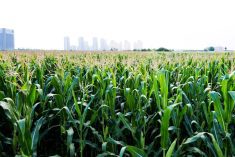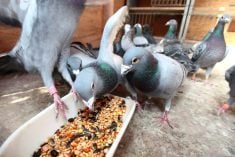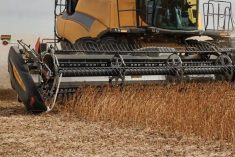China has set up “temporary trade restrictions” on Canadian beef and beef products in the wake of Canada’s first case of BSE in a domestic cow since 2011, federal officials report.
Born in 2009 and confirmed with BSE Feb. 11, the latest case — Canada’s 19th since its first such finding in 2003 — has led China and a handful of other importing countries to re-impose restrictions on Canadian beef, pending further information on the animal and how it may have picked up the brain-wasting disease.
Officials with the Canadian Food Inspection Agency (CFIA) and Agriculture and Agri-Food Canada (AAFC) said on a conference call Friday afternoon they’d been informed that morning of China’s decision.
Read Also

Alberta crop conditions improve: report
Varied precipitation and warm temperatures were generally beneficial for crop development across Alberta during the week ended July 8, according to the latest provincial crop report released July 11.
China in 2014 bought about $40 million worth of Canadian beef, or about two per cent of the total value of Canada’s beef exports, AAFC said.
The ag department said it’s now in contact with Chinese officials to learn more about the exact scope of China’s new ban.
China had shut its ports to Canadian beef following the first BSE case in 2003, but agreed in 2010 to again allow the Canadian product, making Canada the first BSE-affected country ever to export beef to China.
China’s announcement comes as CFIA officials continue their traceback and traceout of Case 19’s birth and feed cohorts.
The birth cohort — animals born on the farm in either 2008, Case 19’s birth year of 2009, or 2010 — includes an estimated 750 animals. The feed cohort, however, is expected to be far larger.
Same farm
That’s partly because CFIA has now also confirmed Case 19 was born on the same northern Alberta farm as Case 17, a cow born in 2004 and confirmed with BSE in 2010.
Thus, the agency said, it now plans to search out any surviving cattle fed on the farm in between the two cases.
Dr. Harpreet Kochhar, Canada’s chief veterinary officer, said on Friday’s call that the agency in 2010 did a “very thorough analysis” of Case 17’s birth and feed cohorts, but its investigation concluded there was no one specific cause that could be identified.
One possible cause, he said, was cross-contamination of feed, if Case 17 had been exposed to feed that wasn’t meant to be fed to ruminants, processed before Canada’s enhanced feed ban took effect in 2007.
The 2007 enhanced ban outlawed the use of any specified risk materials — the tissues in animals known to harbour the misfolded proteins connected to BSE — in livestock feed, pet food or fertilizer.
Because Case 19 was born after the ban took effect, Paul Mayers, CFIA’s vice-president for policy and programs, said Friday the fact that Cases 17 and 19 were born on the same farm is so far the only known link between the two.
Dr. Martine Dubuc, CFIA’s vice-president for science, noted this marks the first time two Canadian cases of BSE were seen from the same birth farm.
Since Feb. 13, other countries suspending Canadian beef and/or beef products in the wake of Case 19’s discovery include South Korea, Taiwan, Indonesia, Peru and Belarus.
The federal government this week passed Bill C-18, the Agricultural Growth Act, saying it offers amendments to the federal Feeds Act and Health of Animals Act that provide “further regulatory tools” for CFIA’s use in BSE-related situations involving livestock feed. — AGCanada.com Network
















